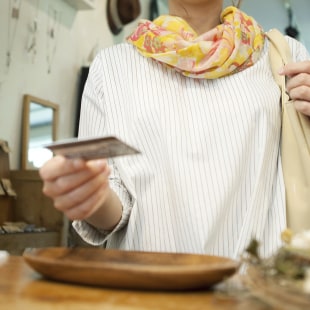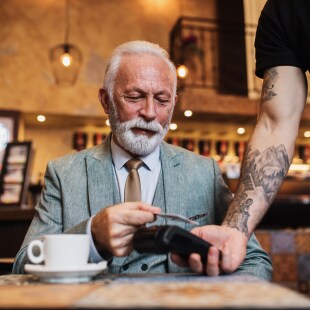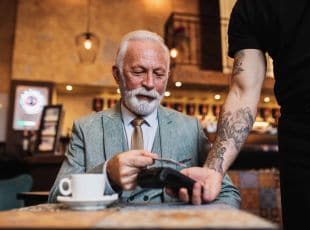Delivering a unified commerce experience
Consumer stories in 2022 are told through various channels. For example, a consumer discovers a new product on social networks, compares it with the various offers on the Internet, places an order from his or her computer, follows it up on his or her smartphone, picks up the product in the shop, calls customer service in case of a problem and leaves a comment on the brand’s website. Keeping track of all these interactions and responding to these new consumption patterns require retailers to implement appropriate payment solutions. The challenges for the banking industry are many: to ensure that payment, the final step in the purchasing process, is smooth, fast and secure; to contribute to unified commerce, which links digital and in-store; and to offer innovative payment solutions.
The goal? Ensure that all visitors are converted into customers and enable them to optimise their offline and online purchasing journey.
This is one of the missions of Axepta BNP Paribas, the Bank’s entity that centralises and imagines all of our innovative payment offers. It’s ambition? Facilitate the transformation of businesses and bring them into the age of digital and unified commerce. To this end, regardless of the sales channel - on or offline - and the means of payment, management and monitoring are carried out from a single back office. “We want to support all forms of commerce and offer simpler payment methods that are more integrated into the shopping experience,” says Emmanuelle François, head of Axepta in Europe.
In addition to means of payment in the strict sense - tap-to-pay to pay with a smartphone, online payment tools and in-store terminals - the payment experience must be “unified”, transparent and fast, regardless of the channel used, online or at the point of sale. This implies connecting payment tools to each other to enable payment for a product on the Internet and reimbursement in shop, or ordering a product in shop by querying stocks.
The challenges of unified commerce
At the conference “Axepta and new payments: Payment in the era of unified commerce - issues and feedback in retail”, M-Loc, a distributor of agricultural equipment in the north of France, provided feedback, through Sophie Hulin, the group’s marketing director. This is a particularly interesting use case, as the company has to multiply payment methods for its customers, who sometimes have to pay by making down payments, transfers, security deposits, online or directly on site. Why we need unified commerce is thus perfectly clear: to connect all means of payment with each other, as well as the data linked to them.
Facilitating large payments in store
BNP Paribas, which is aiming to become the European leader in payments, also presented Instanea, an instant, irrevocable and real-time payment solution. This innovation was developed thanks to collaboration between BNP Paribas and Token, the open banking specialist. In concrete terms, when finalising an order, a new payment option is offered to the customer: to pay for their purchases by connecting directly to their bank’s platform, to trigger, accept or refuse an instant transfer from their current account to that of their supplier.
« Instanea was created to meet retailers’ need to increase conversion rates and make the purchasing process smoother. We have met this need through the achievement of two goals: optimising the customer journey and increasing the conversion rate for customers,” explains Romain Maczkowski, head of major e-commerce accounts at Instanea. In other words, an alternative to exceeded card limits or lost cards. Several retailers, such as Kingfisher and Lapeyre, have already adopted it.
Edlira Jazari, Executive Director of FLOA Pay International, explain Buy Now Pay Later trends
Giving retailers the possibility to offer split payments
Split payments are very popular with French consumers, providing an indispensable service when it comes to making a major purchase. According to a study carried out in January 2022 by L’Echangeur BNP Paribas Personal Finance, a third of French consumers use online payment facilities, whether payment in instalments or deferred payment. The trend is similar in Belgium and Spain*.
Floa, the French leader in payment facilities, which joined the BNP Paribas fold in 2022, offers split payments to its four million retail customers. They can pay for their purchases in 3, 4 or even 10 payments. This solution is widely used in the travel market, where split payments account for between 60 and 80% of purchases. The solution enables customers to increase their purchasing power and also helps businesses to boost their sales in complete security. BNP Paribas provides companies with guarantees: “As a regulated and credit institution, we are better positioned than FinTechs when the market tightens, and we provide a full guarantee of recovery in case of non-payment. We have 15 years’ experience in the “buy now, pay later” sector, with 10 million transactions per year and an instant response in less than 200 milliseconds!” says Alexandre Joie, Head of Partnerships and Products at Floa. While the weight of constrained expenditure represents around 60% of the budget of French, Spanish and Portuguese consumers*, such services provide a solution for consumers to cope with increasing budgetary pressures.
Supporting retailers in their development challenges while promoting more responsible consumption
For larger purchases or projects, BNP Personal Finance, the European leader in personal finance, offers a full range of products from payment to credit and renting. Moreover, renting is fully in line with evolving consumer behaviour, which increasingly favours use over ownership(1). In this context, BNPP Personal Finance has launched a long-term rental product that is combined with a package of value-added services in several verticals (smartphones, bicycles, gaming, PCs, furniture, etc.).
[1] 23.5% of French consumers would be interested in renting a consumer good other than a car. (Source: Access Panel 2022 by L’Echangeur)
“With long-term renting, consumers benefit from rental payments adapted to their budget for the use of the product and associated services. They are guaranteed that the product will have a second life without having to worry about reselling it.” says Julien Montel, Head of Partnerships France, Retail and Home Improvement. For retailers, all of these products contribute to the development of customer loyalty while increasing the average basket, thanks to the upmarket nature of the products.Increasingly aware of the rise of the “one to shop” concept, BNP Paribas is positioning itself as a key player in supporting professionals in keeping up with the changes in e-commerce and retail, thanks to innovative, digital, connected and secure payment solutions. It also promises to optimise the payment process for all types of customers: individuals and professionals.
*Figures taken from L’Echangeur BNP Paribas Personal Finance Access Panel, an observatory of budgetary choices and purchasing habits. Survey conducted online in January 2022, among 14,000 individuals aged 18 and over, representative of the population in France, Belgium, Portugal and Spain.
Julien Montel, BNP Paribas Personal Finance, explain how BNPP Personal Finance enhances customers’ experience in stores
The inevitable growth of digitalisation
Retailers believe that click and collect, contactless payment or omnichannel user experience have become a permanent feature of our habits as a result of the health crisis. In recent months, they have significantly strengthened the digital arrangements they have had in place since 2020. As such, pursuing a digital and virtual transformation remains the most important project for more than 1 in 2 retailers. In the future, 54% of them intend to invest more in digital (e-commerce, social commerce, etc.) and this rises to 67% in France.
Successive crises have pushed companies to think about new growth models. To win more customers, it’s back to basics:
- 42% of retailers declare that they have implemented contextual commerce (or communication adapted to the current situation, in this case on prices) or content commerce (purchasing guides, product or service comparisons or product promotion magazines), both physical and digital.
- 38% have also established partnerships based on a complementary fit. This is the case, for example, with shops-in-shops, where one shop hosts another: Darty or Nature & Découvertes in certain FNAC stores, Prénatal at King Jouet, Go Sport or CDiscount in certain Casino shops or Décathlon or Boulanger areas in Auchan shops, etc.
- 33% have also ventured into social commerce
Finally, 16% of retailers believe that the subscription/renting model is a trend that will redefine the future of their industry. Decathlon has recently started renting out equipment in this respect.
Figures taken from the 2022 World Trade Study, conducted by Havas Commerce from August 4 to September 9, 2022.
of retailers believe that the subscription/renting model is a trend that will redefine the future of their industry
E-Commerce: what will European consumers 2022?
- 84% of customers consider payment security to be crucial
- 64% of online shoppers rank ease of payment as the 2nd most important criterion when making a purchase
- 2/3 of consumers use credit cards and PayPal as payment methods
- 4 out of 5 consumers in France, Italy and Spain purchase products from foreign e-commerce platforms
Source: Opinion Way/Prestashop survey April 2022 (over 4,000 respondents)





